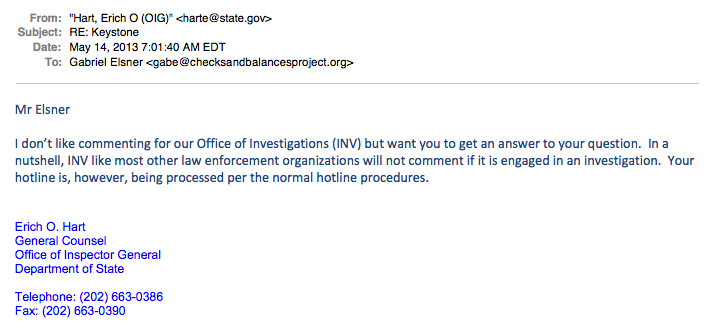The Checks and Balances Project has announced that the U.S. State Department’s Office of Inspector General (OIG) has launched a conflicts-of-interest investigation into dirty dealings pertaining to the contractor tasked to perform the environmental review for the northern half of TransCanada’s Keystone XL tar sands pipeline on behalf of State.
Environmental Resources Management, Inc. (ERM Group) declared the northern portion of Keystone XL as environmentally safe and sound on behalf of State in March, in defiance of the U.S. Environmental Protection Agency’s assessment, among others.
The northern half of Keystone XL will connect to the over 75-percent complete southern half and – if built – will carry Alberta’s tar sands bitumen south to Texas refineries, with most of the final product shipped to the highest bidder on the global market. State and eventually President Barack Obama have the final say over the proposal because the northern section of pipeline crosses the international border.
The overarching problem with that ERM assessment, as first revealed on Grist by Brad Johnson: ERM Group was chosen not by the State Dept., but by TransCanada itself. Furthermore, as first revealed on Mother Jones by Andy Kroll, the State Dept. redacted biographical portions of the EIS that pointed to ERM‘s ongoing close consulting relationship with ERM Group and TransCanada.
“The American public was supposed to get an honest look at the impacts of the Keystone XL pipeline,” writes Checks and Balances‘ Gabe Elsner. “Instead…a fossil fuel contractor, hid its ties from the State Department so they could green light the project on behalf of its oil company clients.”
Instead of an honest look, the public got deception, perhaps not surprisingly given ERM‘s historical contracting relationship with Big Tobacco, as first revealed here on DeSmogBlog. ERM seems to have blatantly lied to the State Dept. – which apparently did no homework of its own, or turned a blind eye at least – and answered “no” to the question shown in the screenshot below.
ERM also told State it was not an energy interest, when the facts say otherwise.
“The State Department question defines an energy interest in part as any company or person engaged in research related to energy development,” wrote Eslner. “Yet, ERM has worked for all of the top five oil companies and dozens of other fossil fuel companies. In other words, ERM is clearly an energy interest.”
For these reasons, a dozen groups (including DeSmogBlog), ranging from environmental NGOs, faith-based groups and government accountability watchdogs called for the Inspector General to investigate why State allowed TransCanada to choose ERM Group.
OIG Special Agent Pedro Colon, Checks and Balances reported, confirmed OIG is “reviewing the matter” in a voicemail left with Elsner. Not satisfied with Colon’s oblique answer, Elsner followed up with OIG via email to ask for more details.
In a May 14 email, Elsner was told the following by Erich Hart, General Counsel to the Inspector General:
It is this email that led Checks and Balances to believe that OIG is engaged in a serious, methodical probe into ERM Group’s activities related to the Keystone XL SEIS environmental review. The group questions why the State Department didn’t recognize a serious conflict-of-interest in choosing ERM.
The question still remains: will it be a serious investigation or a public relations window dressing act? Time will tell.
ERM Group’s Sordid History
ERM Group has a sordid history of green-lighting ecologically perilous projects. Perhaps not surprising given that it is a dues-paying member of Big Oil’s lobbying powerhouse, the American Petroleum Institute (API), which spent $7.3 million on lobbying in 2012 and another $8.6 million on lobbying in 2011.
As covered here on DeSmogBlog, ERM declared the Baku-Tbilisi-Ceyhan (BTC) pipeline that traverses from Azerbaijan, to Georgia and eventually to Turkey as environmentally and ecologically sound – even though it has proven neither. As also covered here, ERM said the Peru LNG and accompanying pipeline project was also environmentally and ecologically sound – again, even though it has proven neither.
So, unless OIG acts on the investigation it says it has opened and tells State to abide by federal contracting conflicts-of-interest law, it appears Keystone XL will be déjà vu all over again for ERM Group and the Obama Administration.
Image Credit: Wikimedia Commons
Subscribe to our newsletter
Stay up to date with DeSmog news and alerts








